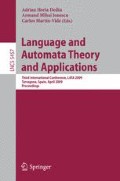Abstract
Integer multiplication as one of the basic arithmetic functions has been in the focus of several complexity theoretical investigations. Ordered binary decision diagrams (OBDDs) are one of the most common dynamic data structures for Boolean functions. Only recently it has been shown that the OBDD complexity of the most significant bit of integer multiplication is exponential, answering an open question posed by Wegener (2000). In this paper a larger lower bound is presented, using a simpler proof. Moreover, the best known lower bound on the OBDD complexity for the so-called graph of integer multiplication is improved.
Ideas presented in this paper were obtained during the Dagstuhl seminar 08381 on computational complexity of discrete problems.
Access this chapter
Tax calculation will be finalised at checkout
Purchases are for personal use only
Preview
Unable to display preview. Download preview PDF.
References
Bryant, R.E.: On the complexity of VLSI implementations and graph representations of boolean functions with application to integer multiplication. IEEE Trans. Computers 40(2), 205–213 (1991)
Woelfel, P.: Bounds on the OBDD-size of integer multiplication via universal hashing. J. Comput. Syst. Sci. 71(4), 520–534 (2005)
Bollig, B.: On the OBDD complexity of the most significant bit of integer multiplication. In: Agrawal, M., Du, D.-Z., Duan, Z., Li, A. (eds.) TAMC 2008. LNCS, vol. 4978, pp. 306–317. Springer, Heidelberg (2008)
Wegener, I.: Branching programs and binary decision diagrams: theory and applications. Society for Industrial and Applied Mathematics, Philadelphia (2000)
Bryant, R.E.: Graph-based algorithms for boolean function manipulation. IEEE Trans. Computers 35(8), 677–691 (1986)
Sieling, D., Wegener, I.: NC-algorithms for operations on binary decision diagrams. Parallel Processing Letters 3, 3–12 (1993)
Gentilini, R., Piazza, C., Policriti, A.: Computing strongly connected components in a linear number of symbolic steps. In: Proc. SODA, pp. 573–582 (2003)
Gentilini, R., Piazza, C., Policriti, A.: Symbolic graphs: Linear solutions to connectivity related problems. Algorithmica 50(1), 120–158 (2008)
Sawitzki, D.: Lower bounds on the OBDD size of graphs of some popular functions. In: Vojtáš, P., Bieliková, M., Charron-Bost, B., Sýkora, O. (eds.) SOFSEM 2005. LNCS, vol. 3381, pp. 298–309. Springer, Heidelberg (2005)
Woelfel, P.: Symbolic topological sorting with OBDDs. J. Discrete Algorithms 4(1), 51–71 (2006)
Bollig, B.: A note on the size of OBDDs for the graph of integer multiplication. Inf. Process. Lett. 109(2), 41–43 (2008)
Amano, K., Maruoka, A.: Better upper bounds on the QOBDD size of integer multiplication. Discrete Applied Mathematics 155(10), 1224–1232 (2007)
Bollig, B., Klump, J.: New results on the most significant bit of integer multiplication. In: Proc. ISAAC, pp. 883–894 (2008)
Bollig, B., Waack, S., Woelfel, P.: Parity graph-driven read-once branching programs and an exponential lower bound for integer multiplication. Theor. Comput. Sci. 362(1-3), 86–99 (2006)
Sauerhoff, M., Woelfel, P.: Time-space tradeoff lower bounds for integer multiplication and graphs of arithmetic functions. In: Proc. STOC, pp. 186–195 (2003)
Bollig, B.: On the OBDD complexity of the most significant bit of integer multiplication (full version). Theoretical Computer Science (invited to special issue)
Hromkovič, J.: Communication complexity and parallel computing. Springer, Heidelberg (1997)
Kushilevitz, E., Nisan, N.: Communication complexity. Cambridge University Press, New York (1997)
Wegener, I.: Optimal lower bounds on the depth of polynomial-size threshold circuits for some arithmetic functions. Inf. Process. Lett. 46(2), 85–87 (1993)
Gergov, J.: Time-space tradeoffs for integer multiplication on various types of input oblivious sequential machines. Inf. Process. Lett. 51(5), 265–269 (1994)
Author information
Authors and Affiliations
Editor information
Editors and Affiliations
Rights and permissions
Copyright information
© 2009 Springer-Verlag Berlin Heidelberg
About this paper
Cite this paper
Bollig, B. (2009). Larger Lower Bounds on the OBDD Complexity of Integer Multiplication. In: Dediu, A.H., Ionescu, A.M., Martín-Vide, C. (eds) Language and Automata Theory and Applications. LATA 2009. Lecture Notes in Computer Science, vol 5457. Springer, Berlin, Heidelberg. https://doi.org/10.1007/978-3-642-00982-2_18
Download citation
DOI: https://doi.org/10.1007/978-3-642-00982-2_18
Publisher Name: Springer, Berlin, Heidelberg
Print ISBN: 978-3-642-00981-5
Online ISBN: 978-3-642-00982-2
eBook Packages: Computer ScienceComputer Science (R0)

